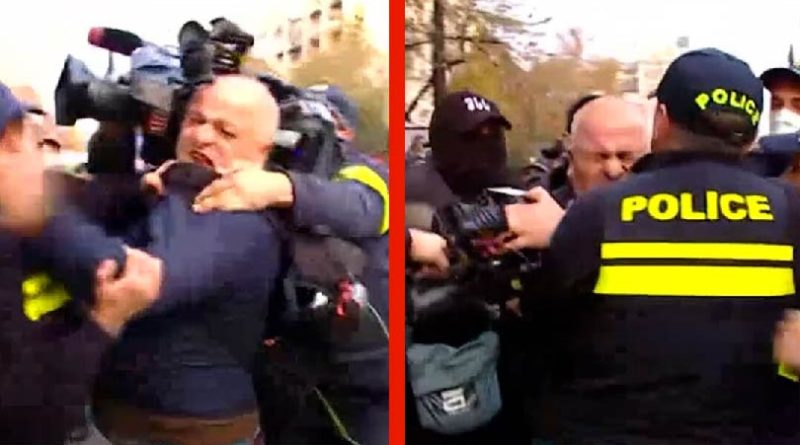Journalism has become a dangerous profession in Georgia
In Georgia, the role of independent media as a “watchdog” is becoming increasingly difficult and dangerous due to growing government control. In 2024, Georgia dropped 26 places in RSF Press Freedom Ranking. It is the largest decline in Eastern Europe and Central Asia. The country now ranks 103rd out of 180 countries.
Reporters Without Borders states that the ruling party’s policy in Georgia is hostile to press freedom. As one of the mechanisms for controlling independent media, Georgian Dream has enacted the Law on Transparency of Foreign Influence, the so-called “Russian law” and the “Foreign agents” law.
The Venice Commission states that “The Law, under the alleged aim of ensuring transparency, has the objective effect of risking the stigmatising, silencing and eventually elimination of associations and media which receive even a low part of their funds from abroad. A strong risk is created that the associations and media which come to be affected will be those who are critical of the government, so that their removal would adversely affect open, informed public debate, pluralism and democracy.
The Venice Commission strongly recommends that the Georgian authorities abandon the special regime of registration, reporting and public disclosure requirements for civil society organisations, online media and broadcasters receiving foreign support.”
Attacks on Journalists
The majority of major TV channels in Georgia are politically biased. National TV stations are split between pro-government and anti-government channels, reflecting the country’s deep political divide. Local television stations, funded by municipal budgets, are heavily influenced by local authorities. In contrast, online media outlets manage to maintain their independence through international funding, despite the challenging media landscape.
Independent and critical media outlets are often the primary targets of government pressure.
During a protest on November 19, Sergi Baramidze, a cameraman for Mtavari Channel, was physically assaulted and unlawfully detained by law enforcement officers while performing his professional duties.
On the same day, OC Media co-founder and journalist Mariam Nikuradze stated that, despite being clearly identifiable as a journalist at the rally, a police officer prevented her from working and confiscated her mobile phone, which she was using to film the dispersal of the protest. “They tried to arrest Nika Melia, the leader of the opposition Coalition for Change. I was filming that moment when I fell, but I continued filming what was happening. You can hear in the video a police officer telling me ‘not to be afraid’ and telling me to get up, which was impossible because many of the officers stepped on me. In another instance, while I was filming another arrest with my phone, yet another police officer pushed me, and I fell again, unable to continue filming,” said Nikuradze and published footage of the incident.
There is a lack of detailed statistics on crimes against journalists, but both local and international organizations often point to the events of 2019-2021, when dozens of journalists were injured during protests. Despite these incidents, investigations were ineffective, and those responsible were not punished, making the situation for press freedom and journalists’ rights even worse.
Elections: Violence Against the Media
The Media Ombudsman says that 30 cases of violations of the rights of media representatives during their coverage of the Georgian parliamentary elections on October 25 and 26, 2024. According to the report, the rights of at least 50 journalists and cameramen were violated.
The pre-election period was also difficult for independent media, during which journalists were attacked by individuals affiliated with local and central government. For example, a journalist from QvemoQartli.ge tried to film the organized transportation of citizens to a Georgian Dream event in Tbilisi, three days before the elections. She was threatened, and her rights as a journalist were restricted by a high-ranking official of the Rustavi municipal service. According to the Media Ombudsman, a member of the Supreme Council of Adjara from the ruling party called a journalist from the independent online media outlet Batumelebi a “traitor.”
It is also worth noting that representatives of pro-government media outlets spoke out about being bullied. However, aggression toward them mainly comes from an audience upset by propaganda. In Georgia,Investigative services focus primarily on cases of violations of the rights of journalists from pro-government media outlets, while often ignoring violence against independent media outlets.
Impunity for Attacks on Journalists
Media reports say that four people convicted of attacking journalists were released early from prison. Their lawyers say they benefited from the amnesty granted by the ruling party, Georgian Dream, just before the parliamentary elections. The Georgian Young Lawyers Association has reported that the European Court of Human Rights is currently reviewing the July 5 case, focusing on potential violations of key rights, including the prohibition of torture, freedom of expression, the right to an effective remedy, and the prohibition of discrimination.
Impunity for crimes against journalists encourages future violence. “Journalism has become a dangerous profession in Georgia. Most of the organisers and perpetrators of physical assaults, threats, smear campaigns or other pressure on journalists are not prosecuted. We observed that this impunity creates a hostile climate for journalists’ work,” says the Mission of the Partner Organizations of the Council of Europe’s Safety of Journalists Platform and members of the Media Freedom Rapid Response (MFRR) consortium.
